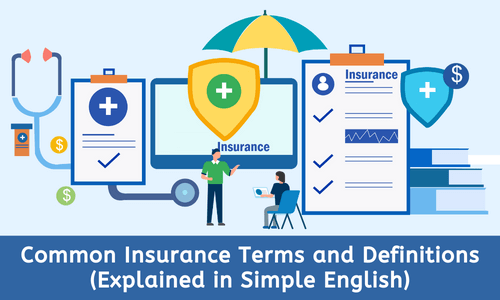Common Insurance Terms
and Definitions
(Explained in Simple English)
English Vocabulary Lessons
This section will help English learners gain a
better understanding of insurance terms and definitions.
By learning insurance-related vocabulary, English learners can
become more confident when discussing insurance or working in
insurance-related fields.
Key insurance concepts and terms will be explained in simple and easy-to-understand language.
Key insurance concepts and terms will be explained in simple and easy-to-understand language.

What Is Insurance?
Insurance is a type of agreement between insurance companies and those they insure (the insured). With insurance, the insurance company agrees to provide financial protection to the insured in exchange for a periodic premium payment. Insurance provides protection against risks, such as damage to property and financial loss due to accidents or tragedy.
Common General Insurance
Terms
Beneficiary:
the person designated by insurance policyholders to receive
insurance payouts in the event of their death.Claim: a request for payment made by insurance companies to those they insure.
Insurance coverage: the specific risks that are covered by an insurance policy. For example, property insurance may cover damages to a house caused by fire, theft, or weather events.
Deductible: the amount of money that must be paid out-of-pocket by the insured before insurance coverage kicks in.
Endorsements: additions or changes to insurance policies that change the terms of coverage.
Exclusions: risks or losses that are not covered by insurance policies.
Grace period: a period of time during which insurance coverage is still in effect despite not having paid the insurance premium.
Policy: a document that outlines the insurance coverage and terms of agreement between insurance companies and the insured.
Policy limits: the maximum amount of money that an insurance company will pay for a claim.
Premium: the periodic payment made to insurance companies for insurance coverage.
Rider: an insurance policy addition or amendment.
Underwriting: the process of evaluating insurance applicants to determine insurance eligibility and the associated insurance premiums.
Types of Insurance
Insurance comes in many forms, each type providing protection
against different risks. The most common types of insurance are property
insurance, liability insurance, health
insurance, and travel insurance.
Property Insurance
Property insurance provides protection for losses or damage to the
insured's home or other property.
Property insurance typically includes coverage for risks such as
fire, theft, and vandalism.
Liability Insurance
Liability insurance protects you if someone gets hurt or their
property gets damaged because of something you did
or didn't do. Common types of liability insurance
include auto insurance, umbrella insurance, and professional
liability insurance. Auto insurance (also known as car
insurance) helps protect you financially if there is an
accident with your car.
Umbrella insurance provides additional insurance coverage for accidents and injuries that exceed the limits of your other insurance policies. For example, If you are in a car accident and the other driver's medical bills are more than your car insurance policy limit, your umbrella insurance policy can provide coverage.
Professional liability insurance (also known as errors and omissions insurance or E&O insurance) can help protect you from financial losses if you are sued for professional errors.
Health insurance is insurance that covers medical expenses.
Health insurance typically covers the cost of visits to doctors,
hospitals, and other health care providers.
Travel insurance provides protection against certain risks
associated with travel. For example, it may cover
the cost of lost luggage, travel delays, and medical emergencies
that occur while traveling.
Umbrella insurance provides additional insurance coverage for accidents and injuries that exceed the limits of your other insurance policies. For example, If you are in a car accident and the other driver's medical bills are more than your car insurance policy limit, your umbrella insurance policy can provide coverage.
Professional liability insurance (also known as errors and omissions insurance or E&O insurance) can help protect you from financial losses if you are sued for professional errors.
Health Insurance
Health insurance is insurance that covers medical expenses.
Health insurance typically covers the cost of visits to doctors,
hospitals, and other health care providers.
Travel Insurance
Travel insurance provides protection against certain risks
associated with travel. For example, it may cover
the cost of lost luggage, travel delays, and medical emergencies
that occur while traveling. List of Insurance Vocabulary Lessons
Disclaimer: This English vocabulary lesson is
for informational and educational purposes only. It is not
intended to be a substitute for professional advice.
Get Updates, Special Offers, and English Resources
Download your FREE GIFT (the first two chapters of
English Short Stories Book and Workbook)
as soon as you join!

By submitting your email, you consent to receiving updates and newsletters from us and to the sharing of your personal data with third parties for the purposes of sending you communications. We will not spam you. You can unsubscribe at any time. For more information, please see our privacy policy.





